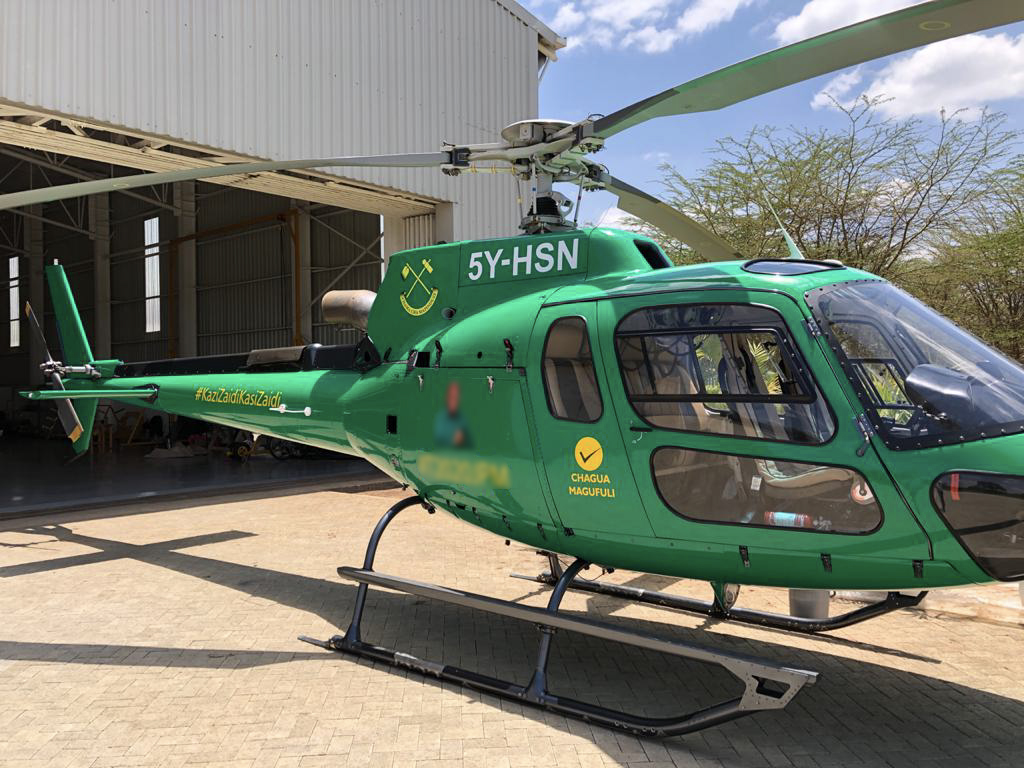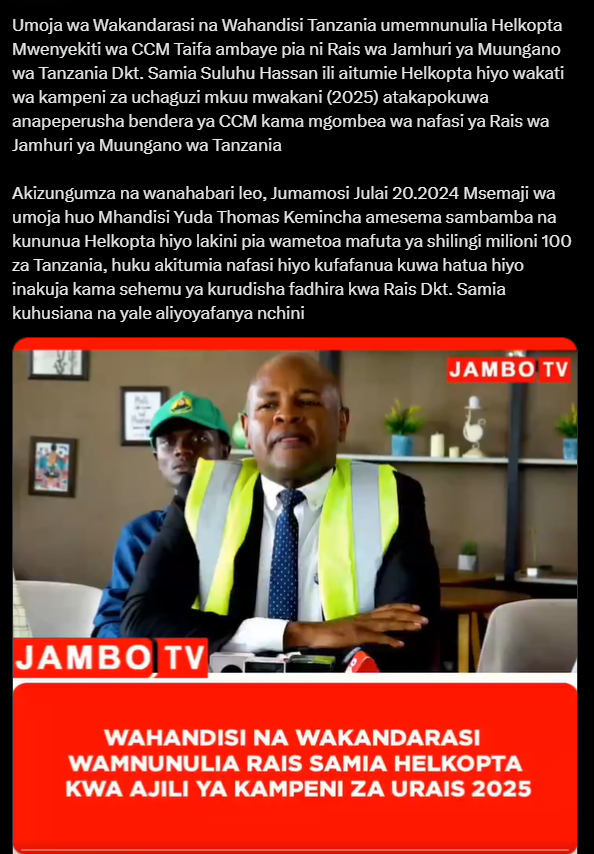A video is going viral on social media that depicts the construction fraternity in Tanzania having decided to fund the presidential re-election campaign of the ruling party with a Tshs 10 billion helicopter and Tshs 100 million to cover the running costs of the chopper. The shared reasons are controversial and possibly illegal, a confirmation of moral rot in our society, and an excruciating reminder that Takrima elections laws were retrogressive for not embracing diversity, electoral justice, equality, and fair competition. This article looks at the conflict of interest and the euphemism of official bribes embodied by the outlawed Takrima election laws.
Takrima laws came into effect in the elections of 2000 and 2005 and were banned in 2006 after the High Court declared them unconstitutional but the Attorney General appealed, and later that judicial effort whittled down Act No. 4 of 2000 which amended s. 98 (2) of the Elections Act by deleting and replacing it with a new provision that was permissive to hospitality election laws of Takrima.
The concept of Takrima was passionately argued that it was grounded in African culture rich in generosity but as the High Court rightly observed it was subject to arbitrariness, abuse, manipulation and discrimination. It is an unfortunate case of misfortune we are still accosting now.
For instance, how did the construction community zero in to pick President Samia Suluhu Hassan as the most befitting to enjoy their electoral philanthropy? Three reasons were forcefully advanced: one, the construction family is doing big business with the government, hence, they felt the urgency to repay the good relationship with that money-guzzling chopper.
The second reason was even more controversial the builders said President Samia Suluhu Hassan has done a good job and deserved their unsolicited and unrelenting support! The constructors rested their case that their support for her defied political party affiliations from their members.
My first concern comes back to one basic question who votes in Tanzania, and why? If big taxpayers with whom we have many unresolved issues gang up to support the ruling party, shall we still call ourselves a functioning democracy or a puppet one?
Read Related: Unfair Taxation or Necessary Evil? The Kariakoo-TRA Conflict: Where Are We Messing Up?
Will big taxpayers become the puppet masters pulling the strings from behind the scenes? Who has convinced big taxpayers that their opinions matter? Who has deceived them into thinking they have a ‘locus standi‘ in our elections?
We know from the data that is available in public gallery foreign contractors sniff out the lion’s share of mega contracts up to 80% of the Trillions allocated for the construction industry.
The scary thought that foreigners are now meddling in our elections should prick our collective conscience. The sovereignty integrity of this great nation is at stake, and we need to ask ourselves whether the disadvantages of handing over our sovereignty to aliens are worthy of the parochial benefits garnered.
Foreigners have different interests from ours. Aliens have been busy seeking to influence our elections in favour of CCM to help neocolonial sympathisers gain an upper hand in crafting public policy to benefit them. Aliens have been angling prime lands and natural resources to profit from them at our expense.
The construction industry is in such a shambolic state that Tarkima will slow the pace and the clamour of cauterising the festering wounds there. Land expropriation in Tanzania is assuming a new dimension and pace as Tanzanians are being uprooted from their ancestral lands to pave the way for foreign ownership and control.
The pace of land disowning of the indigenous Tanzanians will ultimately translate into landlessness of the majority of Tanzanians in as few years as ten to fifteen from now exacerbating social tensions and upheavals that may lead to a national civil strife.
While the construction community claims their funding of the CCM presidential campaign has unanimous support across all member affiliations, they did not explain why opposition parties were excluded. Fairness should ensure that all political parties are treated equally to prevent perceptions of bias and the offering of official bribes for favouritism after the election outcomes favour the ruling party.
What I learnt since I was a toddler is there is no free lunch, and where there is one, remember the price is always in finer prints. Nothing is for free, and we know that big taxpayers would love to see the status quo ante prevail after elections regardless of the true wishes of the electorate. That compromises the tenets of democratic governance as we know them.
Another point to consider is why constructors focus on elections and not on addressing a range of societal issues. We have orphanages struggling to survive. Why not allocate those billions to support them? Our hospitals are also suffering, partly due to the burdensome demands of the NHIF and inadequate budget allocations.
Also, read: Thinking Out Loud: Could This Be The Right Time to Disband The NHIF?
The builders could have been applauded for injecting that mouthwatering cash into those government hospitals. I could be penning down encomiums if the construction community had flushed with cash community causes even to empower street beggars to jump-start their miserable lives.
However, the powerful construction family has chosen to bribe our fractured politics in order to influence decision-makers to overlook their flaws including shoddy work and over-invoicing of projects.
Some might question how the construction industry gains from influencing public policy. The answer lies in the ‘pay to play’ dynamic that emerges from clientelistic relationships. Such arrangements effectively legalize corruption, restricting the autonomy of decision-makers to defend national interests, and reducing them to agents serving foreign interests.
During the 2000 election, claims circulated that big miners had bought vehicles for CCM, stirring discussions mainly in informal settings. At that time, Abdallah Kigoda served as both the CCM National Treasurer and the Minister for Energy and Minerals (1997-2000).
Many speculated that President Benjamin Mkapa appointed Kigoda to multiple roles to secure tax exemptions for big miners, benefiting CCM’s election funds. Unsurprisingly, the Mkapa administration and successors delayed meaningful reforms in the mining sector, avoiding reforms that could have greatly benefited the treasury instead of overburdening the average taxpayer.
Big taxpayers’ influence in our elections through deep tax exemptions fosters an unhealthy relationship. Their significant role in politics renders our leaders less effective, turning them into puppets of these taxpayers, who are notorious for avoiding taxes.
As large taxpayers increasingly influence our elections, our leaders become less inclined to enforce their tax obligations. Consequently, the burden of taxation shifts to smaller taxpayers, stifling entrepreneurial spirit and weakening the job market. This dynamic contributes significantly to unemployment, as big taxpayers fail to pay their fair share, forcing smaller businesses and individuals to bear the cost of their tax avoidance.
We have long advocated for all domestic taxes designated for infrastructure investment to be managed by Tanzanian citizens. However, the practice of ‘Takrima’ may cloud the judgment of our decision-makers, undermining our efforts to empower local professionals in this field.
If Tanzanian professionals are not trusted and given leadership roles, achieving our developmental goals will be challenging. Moreover, jobs will remain at risk as foreign experts overshadow our local talent.
Out of respect for our sovereignty, now threatened by foreign interests, I urge President Samia Suluhu Hassan to respectfully decline the helicopter and associated amenities. Instead, she should donate this equipment to a government hospital in dire need. Such assertiveness is demanded by our national moral authority and nothing less.


